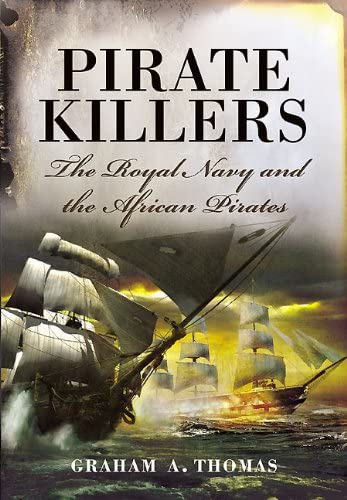Reviewed by CAPT Richard Dick, USN (Ret.).
Graham A. Thomas is a historian, biographer, journalist, and theatrical producer. He has written for the UK Ministry of Defence and has been editor of the British Army Review, the army’s official academic journal. He specializes in the history of the British Army and Royal Air Force in World War II and the Korean Conflict but has also written several books on the histories and biographies of pirates and pirate hunters.
This book grew out of the author’s research on Captain Woodes Rogers, a Royal Navy pirate hunter and commerce raider in the Caribbean in the early eighteenth century. Pirate Killers looks primarily at the interactions between the Royal Navy and pirates around Africa (most of which ended up in gunfire). While discussing operations around Madagascar and West Africa, Thomas focuses most intently on the Barbary and Rif (or Reef) pirates operating in and near the Mediterranean.
He begins with a useful overview of Mediterranean piracy from the seventeenth century on and then zeroes in on the rise of the Barbary pirate states. These denizens of the North African coast operated from the principalities of Algiers, Tripoli, and Tunis, nominally under the suzerainty of the Ottoman sultan. While the Barbary pirates were more than happy to take goods and valuables, their consistent stock in trade was people- men, women, and children from the states of Christian Europe (and later the United States). Although they raided as far north as Ireland and beyond to take captives to be ransomed or sold as slaves (as discussed in Des Ekins’ book, The Stolen Village), their main targets were merchant ships inside the Mediterranean. European powers and eventually the U.S. tried repeatedly to negotiate with or destroy the Barbary powers but did not permanently suppress any of them until France conquered Algiers in 1829 (see Richard Allison’s Crescent Obscured or Frederick Leiner’s End of Barbary Terror, among others, for the U.S. efforts). Thomas chronicles the Royal Navy’s several efforts to control the pirates while avoiding a costly and politically complicated full-scale war. In particular, he examines the 1816 Battle of Algiers, in which a British fleet under Lord Exmouth devastated Algiers, only to see the city rebuilt and back in the pirate business in two years.
The book also describes the activities of the Rif pirates, who operated in rowing launches from the Atlantic coast of Morocco against European merchant ships who strayed too close to shore. Unfortunately, in some cases Thomas’s narrative of specific British operations against the Rif, such as the rescue of the merchant ship The Three Sisters in 1848, are so detailed that it slows his narrative and bogs the reader down.
As noted above, the author also looks at piracy off West Africa, including Bartholomew Roberts’ horrifying attack on the slave ship Porcupine in which 80 slaves were burned alive or killed by sharks. Thomas also gives a good overview of the Royal Navy’s efforts against pirates operating in the Indian Ocean, particularly those operating out of Madagascar.
Pirate Hunters has several strengths- it incorporates the author’s impressive research (although he does not footnote his sources) and is reasonably well written. Especially in looking at Barbary and the Rif, Thomas objectively presents the Navy’s challenges, constraints, successes, and failures. The book’s main weaknesses are the scarcity of maps and the excessive detail in some sections, which distract the reader from the overall picture.
Captain Dick is a retired submariner; he also served for over 29 years in the defense intelligence community.
Pirate Killers: The Royal Navy and the African Pirates. By Graham A. Thomas (South Yorkshire: Pen and Sword Maritime, 2021).


